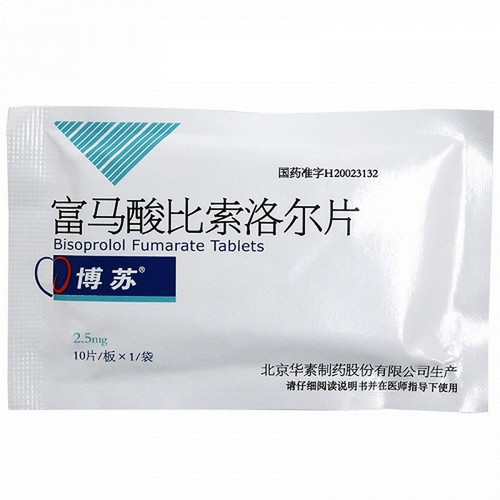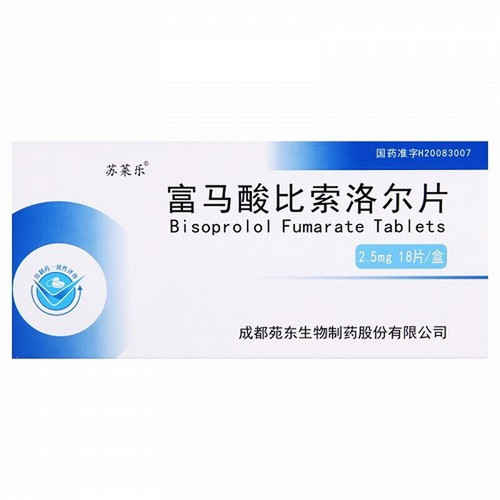Product Overview
[Drug Name]
Generic Name: Bisoprolol Fumarate Tablets
Trade Name: Shan Yi Xin Bisoprolol Fumarate Tablets 5mg*10 Tablets
Pinyin Code: ShanYiXin FuMaSuanBiSuoLuoErPian 5mg*10 Tablets
[Main Ingredients]
The main ingredient of this product is bisoprolol fumarate. Chemical Name: (±) 1-[4-[[2-(1-methylethoxy)ethoxy]methyl]-phenoxy]-3-[(1-methylethyl)amino]-2-propanol fumarate. Molecular Formula: (C₁₈H₃₁₁NO₄)₂·C₄H₄O₄. Molecular Weight: 766.96
[Properties]
This product is a yellow, round, film-coated tablet.
[Indications/Main Functions]
Hypertension, coronary heart disease (angina pectoris). Moderate to severe chronic stable heart failure with impaired ventricular systolic function (ejection fraction ≤35%, as determined by echocardiography). Prior to using this product, patients must be treated with an ACE inhibitor, diuretics, and selective cardiac glycosides.
[Precautions]
For chronic stable heart failure: Bisoprolol treatment of stable chronic heart failure must be initiated with a specific dose-escalation period and regular monitoring. For all indications. Bisoprolol treatment should not be abruptly discontinued, especially in patients with ischemic heart disease, unless specifically indicated, as this may result in a transient worsening of cardiac status. This product should be used with caution in the following situations: 1. Bronchospasm (bronchial asthma, obstructive airway disease); 2. Diabetic patients with large fluctuations in blood glucose levels; these may mask symptoms of hypoglycemia; 3. Strict fasting; 4. A history of severe allergies; 5. Patients undergoing desensitization therapy. Like other beta-blockers, bisoprolol may increase sensitivity to allergens and the severity of allergic reactions. Epinephrine therapy may not always produce the desired therapeutic effect. 6. First-degree atrioventricular block 7. Variant angina 8. Peripheral arterial occlusive disease (symptoms may worsen, especially at the start of treatment) 9. Patients undergoing general anesthesia should be informed if they are taking a beta-blocker. If it is deemed necessary to discontinue beta-blocker therapy before surgery, the dose should be gradually reduced and completed 48 hours before anesthesia. There is no experience with bisoprolol in the treatment of heart failure with the following diseases or conditions: • NYHA class II heart failure • Insulin-dependent (type 1) diabetes mellitus • Severe renal impairment • Severe hepatic impairment • Restrictive cardiomyopathy • Congenital heart disease • Organic valvular disease with significant hemodynamic changes • Myocardial infarction within 3 months. Patients with bronchial asthma and other chronic pulmonary obstructive disorders may experience symptoms when using this drug, so bronchodilator therapy should be administered concurrently. Patients with asthma may occasionally experience increased airway resistance when using this drug, so the dose of the beta-2 agonist should be increased. Like other beta-blockers, bisoprolol may increase sensitivity to allergens and exacerbate allergic reactions. In such cases, epinephrine therapy may not produce the desired therapeutic effect. Patients with psoriasis or a family history of psoriasis should only consider the use of beta-blockers (such as bisoprolol fumarate tablets) after carefully considering the risks and benefits. Patients with pheochromocytoma should only take bisoprolol after taking an alpha-blocker. Bisoprolol therapy may mask the symptoms of thyrotoxicosis. Unless otherwise indicated, bisoprolol therapy should not be abruptly discontinued. Because the antihypertensive effect of this drug varies from person to person, its use may impair the patient's ability to drive or operate machinery. Caution is advised when starting medication, increasing the dose, and taking it with alcohol. Athletes should use with caution.
[Drug Interactions]
Bisoprolol is contraindicated in the following patients: 1. Patients with acute heart failure or decompensated heart failure requiring intravenous inotropic therapy; 2. Patients with cardiogenic shock; 3. Patients with second- or third-degree atrioventricular block (without a pacemaker); 4. Patients with sick sinus syndrome; 5. Patients with sinoatrial block; 6. Patients with symptomatic bradycardia; 7. Patients with symptomatic hypotension; 8. Patients with severe bronchial asthma or severe chronic obstructive pulmonary disease; 9. Patients with advanced peripheral arterial occlusive disease and Raynaud's syndrome; 10. Patients with untreated pheochromocytoma; 11. Patients with metabolic acidosis; 12. Patients with known hypersensitivity to bisoprolol, its derivatives, or any of its components.
[Specifications]
5mg x 10 tablets
[Dosage and Administration]
For all indications: This product should be taken in the morning, optionally with a meal. Take with water and do not chew. This product must be used as prescribed by a physician. Treatment of hypertension and angina: Typically, 5 mg of bisoprolol fumarate is taken once daily. Mild hypertension can begin with 2.5 mg of bisoprolol fumarate. If this response is inadequate, the dose can be increased to 10 mg of bisoprolol fumarate once daily. The dosage should be adjusted based on individual needs, with particular attention paid to pulse and therapeutic response. This medication is recommended for long-term use. Do not change the dosage or discontinue it easily. If discontinuation is necessary, it should be done gradually, not abruptly. Patients with ischemic heart disease require particular caution. (See package insert for details.)
[Adverse Reactions]
See package insert for details.
[Contraindications]
Bisoprolol is contraindicated in the following patients: 1. Patients with acute heart failure or decompensated heart failure requiring intravenous inotropic therapy; 2. Patients with cardiogenic shock; 3. Patients with second- or third-degree atrioventricular block (without a pacemaker); 4. Patients with sick sinus syndrome; 5. Patients with sinoatrial block; 6. Patients with symptomatic bradycardia; 7. Patients with symptomatic hypotension; 8. Patients with severe bronchial asthma or severe chronic obstructive pulmonary disease; 9. Patients with advanced peripheral arterial occlusive disease and Raynaud's syndrome; 10. Patients with untreated pheochromocytoma; 11. Patients with metabolic acidosis; 12. Patients with known hypersensitivity to bisoprolol, its derivatives, or any of its components.









